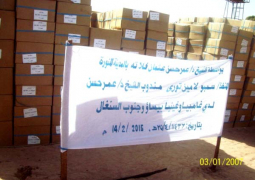The
Gambia Competition and Consumer Protection Commission (GCCPC) and the Public
Utilities Regulatory Authority (PURA) Thursday held a daylong workshop to
introduce the Advertisement Regulation contained in section 12 of the Consumer
Protection Act, and the new complaints management system developed by PURA.
The
workshop also witnessed the signing of an MoU between GCCPC and PURA.
The
GCCPC is an independent public institution created to enforce the Competition
Act 2007 and Consumer Protection Act 2014, which aims to promote and enforce
fair competition in the Gambia’s economy, as well as to protect the welfare of
consumers of goods and services available in the country.
Speaking
at the ceremony held at the Senegambia Beach Hotel, Naffie Barry, permanent
secretary, Ministry of Trade, Industry and Employment, said since the
advertisements are basically meant to promote a product or a service, “one does
see some exaggeration in the way they extol the virtues of the product”.
“When
it goes beyond that, it deliberately utters a falsehood or tries to
misrepresent facts, thereby misleading the consumer, then it becomes
objectionable,” she said.
PS
Barry noted that these regulations are timely, and she has no doubt that they
would be fully implemented by the GCCPC.
According
to PS Barry, one of the fundamentals of a market economy is the free flow of
information about goods and services offered for sale.
She
added that the underlying theory is that the more consumers are informed, the
better equipped they would be able to make purchase decisions appropriate to
their own needs.
PS
Barry further stated that advertising enhances market performance by providing
useful information to consumers, and by enabling firms to promote the
attributes of their products and services, hence to compete better with each other.
Amadou
Ceesay, executive secretary of GCCPC, in his welcome remarks, said PURA is a
sector regulator and GCCPC is an enforcement agency.
He
noted that PURA is in charge of the PURA Act 2001 and the ICT Act 2010 and the
GCCPC enforces the CA 2007, and administers the consumer protection Act 2014
through the consumer protection tribunal.
He
also said that together with the Ministry of Trade, Industry and Employment, it
administers the Essential Commodities Act 2015.
He
added that competition enforcement and sector regulations are complementary
instruments.
“We
share common goals and, therefore, must work together to understand the limits
and roles of regulations and competition law. This is what we hope to achieve
through this MOU,” he said.
Also
speaking at the ceremony was Ansumana Sanneh, Director General of PURA, who
said his institution was proud to be associated with GCCPC in this very
important venture of launching a code of conduct.
The
document sets out the principles, requirements, services and actions a consumer
could reasonably expect a from retailer or service provider, he said.
He
added that regulators like GCCPC and PURA have been playing an important role
in the regulated sectors, as well as the economy as a whole.
“This
welcomed development naturally brings with it greater competition as operators
vie for an increase in market share, and consumers are directly benefitting by
having more choices and better quality and prices for the services that they
have obtained from operators.”
He
explained that with competition there is always the issue of fair play, as each
entity seeks to gain an edge over its competitors; therefore, institutions like
PURA and GCCPC must be put in place to monitor the activities of the operators.
Read Other Articles In Article (Archive)




